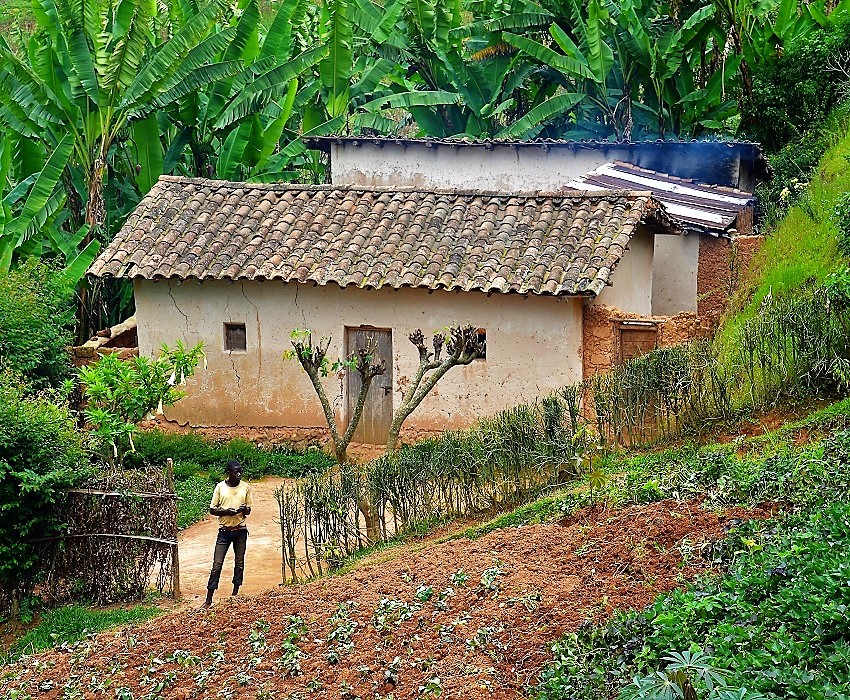Nehemie in the countryside in Rwanda
December 14th, 2017
Have you ever wondered how household tasks are divided between men and women? Or do you find yourself thinking: “I didn’t decide on the division of household labour. Some tasks are just made for men and others for women. That is how it’s been traditionally done?”
To change this attitude in Rwanda, we are currently developing new training materials on gender mainstreaming in agriculture. One of the topics is “renegotiation of role division in rural households”. To develop the course material on this topic, I left the city and visited rural areas to understand first-hand how men and women divide household tasks in rural Rwanda. I discovered a lot of things I did not know.
Many couples do not discuss the division of household chores because they were raised in families where boys and girls were assigned different tasks. For example, boys had to take out cows, milk them, construct fences or the house, while girls did work around the house, cleaning, doing the dishes and caring for young siblings. Many have not questioned this division of labour, let alone consider changing it.
You copy what you see
Socialisation plays a big role in our development; the way we are raised affects our current behaviour. When men and women leave their parents’ home to start their own family, they bring that socialisation with them to their newly-formed family. For instance, a woman said: “I have too much work at home but I cannot change it. I cannot change what our culture dictates.” I found it astonishing that in the face of such heavy workloads at home, women still do not question tradition or explore the relevance of traditional practices.
A man told me: “Women are forbidden from milking cows unless no man is available to do it. She has to first look for a male neighbour or family member to help.” However, as cattle rearing for milk is common business, few men would consider doing it for free. This begs the question: Why are we asking women pay men to milk cows when they can save the money by doing it themselves?
What will others think?
Some people are afraid of what others would think if they challenged the status quo. A woman told me: “If a neighbour finds my husband washing dishes or cleaning the compound, they may think that I bewitched him or that he is stupid. Every chore I perform in the household, my husband can do it too. For example, when I am sick, he does them. However, the work that he performs in the household, such as digging toilets and building the house, I cannot perform because I am not strong enough.”
I did not confront her with the fact that women also participate in hard labour in Rwanda, constructing roads and working in fields.
In speaking to families and individuals, I have learnt that not many understand what gender equality truly means. For example, a man said: “We believe and practice gender equality at home, but there is obviously work meant for men and others for women.”
People need truly understand gender equality for our society to change. Many think gender equality can be measured simply by the number of females engaged in politics or what is written in the law.
A shift in attitudes and practices needs to happen so men are more involved in household tasks and women are more involved in income generation. To achieve true gender equality, women need to feel empowered and confident in their capacity to perform as well as men in any task.
Families who do well
A bright spot in my travel around rural Rwanda: Some families are ahead of the curve. A woman told me: “In our house, we share the work. There is no work meant for boys or girls. My husband and I discussed what we want to achieve in life how we can achieve it together. We concluded that we can achieve many things if we work together instead of dividing up the work between men and women or girls and boys.” I found this very encouraging. I’m convinced that when couples sit together and discuss their joint ambitions and how to organise their household accordingly, they will live in harmony and lead a prosperous life. The idea is not to make men work more, but that the household work should be shared so women can dedicate as much time as men to developing themselves and become economically empowered.
Let’s combine efforts
Would you like to share your story on gender equality and empowerment? The Rwandan Government has done many things to achieve gender equality and women empowerment but we still have much to do in our homes, communities, schools and workplaces to achieve it. We need to work together as the private sector, INGOs, NGOs, religious institutions and the government to achieve more gender equality and develop rural households.
In the next few weeks, I will take all the lessons learned and make material for gender trainers. You will be able to find the course materials here in a few weeks.
Wish me luck!
Nkurunziza Nehemie

